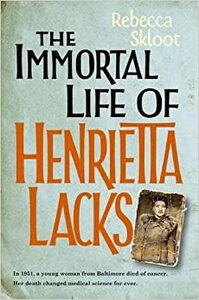Take a photo of a barcode or cover
informative
inspiring
sad
medium-paced
Mind-blowing! Un-freak-in-for-get-able!!! Researchers and companies benefited from her cells while Henrietta’s family lived in poverty completely unaware of what happened. It’s deeply upsetting to see how she was treated!!! Her cells changed the world, yet she was never asked, never acknowledged during her life, and her family saw none of the benefits.
Interesting read about the history and ethics of cell research and the family of a woman whose cancer cells have been used extensively in scientific studies.
From my viewpoint, go ahead and use anything you can take from me to further science. My MiRho cells are useless to me when I'm gone, so whatever scientists can use from my gizzards and other assorted innards, have at it, and blast the rest off into space.
From my viewpoint, go ahead and use anything you can take from me to further science. My MiRho cells are useless to me when I'm gone, so whatever scientists can use from my gizzards and other assorted innards, have at it, and blast the rest off into space.
I found this book fascinating. I enjoyed learning about the history of cell culture as well as the examination of the ethics of tissue donation and commercialization.
dark
informative
sad
medium-paced
challenging
informative
reflective
sad
slow-paced
informative
reflective
sad
medium-paced
Such an eye-opening look into not only medical morality issues, but specifically how Black patients were treated throughout the 1900s.
adventurous
challenging
dark
emotional
funny
hopeful
informative
inspiring
reflective
sad
tense
fast-paced
john hopkins, you fucked up.
This book is a stunning example of why you cannot take the humanity out of science and research. Scientific progress always comes at the expense of individual lives, like Henrietta Lacks and her family. These expenses disproportionately affect black and brown people.
This was beautifully written and extremely emotional. Should be taught in schools
This book is a stunning example of why you cannot take the humanity out of science and research. Scientific progress always comes at the expense of individual lives, like Henrietta Lacks and her family. These expenses disproportionately affect black and brown people.
This was beautifully written and extremely emotional. Should be taught in schools
adventurous
dark
emotional
informative
inspiring
reflective
sad
medium-paced
A fascinating and important story that needs to be told in terms of what it reveals about race in the USA. For all that, there's something slightly artless and lack-lustre about the writing itself both in terms of its language and the way the work is structured.
This book does seriously read like a novel. I devoured it in two days, and wanted more. Rebecca Skloot does a fantastic job of painting a picture of this horribly frustrating situation and coming from both sides of it, letting the reader decide what they think about science and research, and humanity. The strong presence of the Lacks family made this book so well-rounded and personal, I found myself wanted to turn back the clocks so that no bad things could happen to them. And then there's so much scientific knowledge and discussion around the HeLa cells (that I truthfully had never heard of), yet nothing that will bog the reader down.




